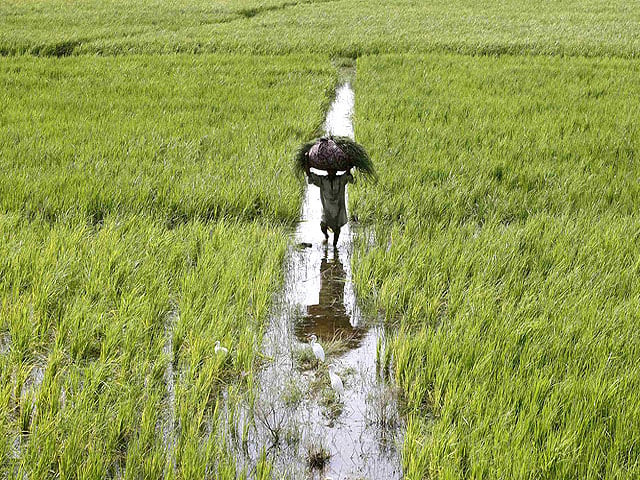UAF VC: Experts stress on modified crops to beat hunger
Agricultural scientists aim to ensure food security.

Increase in per acre production is the key to alleviating hunger from the country, says Dr Khalid Mehmood. PHOTO: FILE/REUTERS
UAF Vice-Chancellor Dr Iqrar Ahmad Khan, AARI’s new Director-General Dr Abid Mehmood and outgoing DG Dr Noorul Islam Khan discussed the issue at a reception held at the UAF in honour of incoming and outgoing DGs.
Dr Iqrar Ahmad Khan said agricultural scientists – most of them alumni of UAF – had so far developed 5,000 new varieties of crops across the country.

He said joint research activities by UAF and AARI had picked up pace keeping in view the challenges confronting the country. As a result, average agriculture production has grown. Wheat production has risen 7%, rice 13%, sugarcane 8% and potato 116%.
“Food security situation is worsening and now we have to depend on growing genetically modified (GM) crops to avert hunger,” he suggested.
Arid Agriculture University Rawalpindi’s former vice-chancellor Dr Khalid Mehmood did not link food security to wheat production only, saying “we have to focus on other crops as well to meet challenges of the 21st century.”
“Increase in per acre production is the key to alleviating hunger from the country,” he said.
Abid Mehmood underlined the need of strengthening the agriculture sector by promoting value addition, introducing technology to stem post-harvest losses and adopting latest agricultural practices.
Terming agriculture the lifeline of the country’s economy, he pointed out that it was contributing 21% to the gross domestic product with more than 60% of population associated with the sector. Collaborative efforts were bringing tangible results for making improvement in the sector, he said.
Noorul Islam said AARI had developed more than 425 new varieties of different crops, a guarantee for a substantial boost to overall per acre yield. With the efforts of agricultural scientists, he said, wheat production in Punjab had greatly increased.
Published in The Express Tribune, October 29th, 2013.
Like Business on Facebook, follow @TribuneBiz on Twitter to stay informed and join in the conversation.


















COMMENTS
Comments are moderated and generally will be posted if they are on-topic and not abusive.
For more information, please see our Comments FAQ